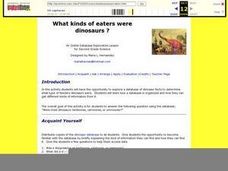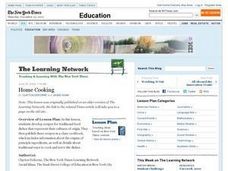Curated OER
What Kind of Eaters Were Dinosaurs?
Second graders use a database to gather more information on dinosaurs. Using the information, they discover how the database is organized and how to get different information from it. They complete a worksheet with comprehension...
Curated OER
An International Menu
Students research etymologies using dictionaries. They explore the diverse origins of the common foods they eat after making a list of their favorite foods.
Curated OER
Nutrition
Fourth graders engage in an original unit about nutrition and record daily intake of food in order to help create a healthy eating plan. They practice making practical food choices for optimum health and then investigate how to maintain...
Curated OER
Why Are People Hungry?
Students examine the reasons why people throughout the world are suffering from malnutrition. In groups, they research the origins of various foods and how they are processed before they arrive at the store for us to purchase. They...
Curated OER
Why are People Hungry and Malnourished?
Young scholars read "The Story of Miguel's Tomatoes" to review the steps involved in the food system. In groups, students complete a food system chart. Using the chart as a model, young scholars choose a commonly eaten food and trace it...
Curated OER
Minnesota-China Connections: Chinese Flavors
Students discuss the foods which are typical of a Chinese diet. They find recipes and observe and sample various Chinese foods. They record their opinions about what they taste and experience in a journal entry.
Curated OER
How Far Did It Travel?
Sixth graders read and discuss background and vocabulary. They use the background to develop a flow chart showing the movement of food from farm to table and work independently or in groups to complete an activity. They then use Internet...
Curated OER
Follow that Cheese
Young scholars research types of cheeses. In this cheese types lesson, students research the origin of cheese and then investigate the area of origin. Young scholars share their reports. Students have a cheese tasting celebration as a...
Curated OER
Thanksgiving: Traditions
Students investigate the traditions and history around Thanksgiving. They divide into groups and research specific aspects of the holiday. Students then share their findings with the rest of the class. They also complete crafts,...
Curated OER
Snacks in a Bag
Learners brainstorm a list of their favorite snacks. Using clues, they identify the type of snack being described. On a map, they identify and locate the origin of the ingredients used to make it. They write their own clues for...
Curated OER
Home Cooking
Students explore the link between home and food in a writing exercise. They study and discuss how some Hispanic immigrants keep in touch with their culinary origins. They develop a recipe that represents their ethnic origin. They...
Curated OER
Cuisine Art
Students explore the history of the foods of different ethnic groups and the significance of these foods in perpetuating culture.
Curated OER
Photosynthesis
In this biology worksheet, students explain where the energy of food originally came from. Then the explain one of the principal chemical compounds that living things use to store energy. Students also describe how ATP and ADP differ and...
Curated OER
Cooking Up an Explanation
Students pose scientific questions about food items and research their explanations. They then create recipe cards with the answers and present their findings in a cooking show format.
Curated OER
Dietary Guidelines
Students study the dietary guidelines and what they do. In this healthy eating lesson students study nutrition labels and calorie needs.
Curated OER
Frighteningly Fabulous Festivals
Students explore the significance of holiday foods, first by researching Halloween-type festivals from around the world, and then by reporting on foods related to different holidays celebrated in their homes.
Curated OER
Nutrients by the Numbers
Learners read and discuss an article on the amount of sugar in various food products. They compare the nutritional values of food products, calculate their daily intake of nutrients, analyze serving sizes, and compare/contrast their own...
Curated OER
Cookie Creations
Students, in teams, create and prepare an original cookie recipe. They market their cookie by designing creative packaging and advertising. They compete with other groups in a cookie contest.
Curated OER
Altered Genes
Learners describe the economic relationship between farmers, consumers, and food companies. They examine the issues regarding the reactions of consumers in this country and other countries to the use of gene-altered crops in food...
Curated OER
Cultures and Cuisines WebQuest
Learners create and present a powerpoint presentation. In this cultures and cuisines research lesson, students select a country, interview someone from that country and visit a restaurant from that country. Learners complete research...
Curated OER
Importance of the Rain Forest
Students use the Internet to conduct a research project. In this rain forest lesson plan, students work in groups to research different parts of the rain forest. Students research climate, foods, house products and medicines. Each...
Curated OER
Family Tree
Students create a family tree in this culminating activity to their family unit. In this family tree lesson, students extend their learning about the family unit by working in small groups to develop a three generation family tree. They...
Curated OER
Carbohydrates-Simple and Complex
Grain products are staple foods and sources of simple and complex carbohydrates that provide energy for the body. Define simple and complex carbohydrates Identify function and sources of simple and complex carbohydrates Describe how...
Curated OER
WHAT'S ORGANIC?
Students explore how certain foods come to be certified "organic." They write the words "organic" and "synthetic" and given the definitions of each. Students are given dictionaries. They are asked: "What is organic food?" Students grow...

























